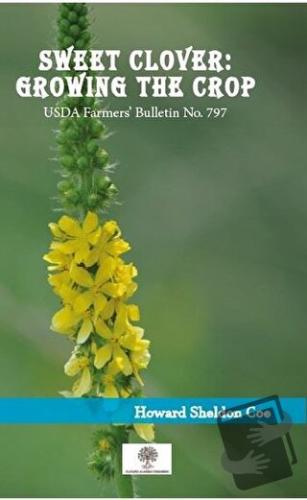
“Sweet clover is an important forage crop in many regions. Although one of the oldest of known plants, not until ver y recently has it been considered seriously as a forage plant in this country. The principal causes for not utilizing this crop were its aggressiveness on uncultivated land in many localities, the tendency of the stems to become woody as they mature, and the refusal of stock to eat sweet clover before they had become accustomed to the bitter taste. Another reason was the fact that until recently red clover could be grown in the eastern half of the United States without difficulty. In northern Kentucky the continuous growing of tobacco or of tobacco and wheat impoverished the soil to such an extent that crops no longer could be grown successfully. Upon the abandoned farms in this section sweet clover was introduced as a honey plant. Owing to the remarkable yields of tobacco that were obtained on such farms after sweet clover had been grown for a few years the acreage of this plant increased very rapidly. For a number of years sweet clover has been grown on the Selma chalk (rotten-limestone) soils of Alabama and Mississippi as a soil-improving crop. At the present time it is being cultivated in practically every State, and the acreage is increasing ver y rapidly.”
| Taksit Sayısı | Taksit tutarı | Genel Toplam |
|---|---|---|
| Tek Çekim | 170,80 | 170,80 |
| 3 | 62,22 | 186,65 |
| 6 | 32,85 | 197,09 |
| 9 | 23,06 | 207,54 |
| 12 | 18,16 | 217,96 |
| Taksit Sayısı | Taksit tutarı | Genel Toplam |
|---|---|---|
| Tek Çekim | 170,80 | 170,80 |
| 3 | 62,22 | 186,65 |
| 6 | 32,85 | 197,09 |
| 9 | 23,06 | 207,54 |
| 12 | 18,16 | 217,96 |
| Taksit Sayısı | Taksit tutarı | Genel Toplam |
|---|---|---|
| Tek Çekim | 170,80 | 170,80 |
| 3 | 62,22 | 186,65 |
| 6 | 32,85 | 197,09 |
| 9 | 23,06 | 207,54 |
| 12 | 18,16 | 217,96 |
| Taksit Sayısı | Taksit tutarı | Genel Toplam |
|---|---|---|
| Tek Çekim | 170,80 | 170,80 |
| 3 | 62,22 | 186,65 |
| 6 | 32,85 | 197,09 |
| 9 | 23,06 | 207,54 |
| 12 | 18,16 | 217,96 |
| Taksit Sayısı | Taksit tutarı | Genel Toplam |
|---|---|---|
| Tek Çekim | 170,80 | 170,80 |
| 3 | 62,22 | 186,65 |
| 6 | 32,85 | 197,09 |
| 9 | 23,06 | 207,54 |
| 12 | 18,16 | 217,96 |
| Taksit Sayısı | Taksit tutarı | Genel Toplam |
|---|---|---|
| Tek Çekim | 170,80 | 170,80 |
| 3 | 62,22 | 186,65 |
| 6 | 32,85 | 197,09 |
| 9 | 23,06 | 207,54 |
| 12 | 18,16 | 217,96 |
| Taksit Sayısı | Taksit tutarı | Genel Toplam |
|---|---|---|
| Tek Çekim | 170,80 | 170,80 |
| 3 | - | - |
| 6 | - | - |
| 9 | - | - |
| 12 | - | - |
“Sweet clover is an important forage crop in many regions. Although one of the oldest of known plants, not until ver y recently has it been considered seriously as a forage plant in this country. The principal causes for not utilizing this crop were its aggressiveness on uncultivated land in many localities, the tendency of the stems to become woody as they mature, and the refusal of stock to eat sweet clover before they had become accustomed to the bitter taste. Another reason was the fact that until recently red clover could be grown in the eastern half of the United States without difficulty. In northern Kentucky the continuous growing of tobacco or of tobacco and wheat impoverished the soil to such an extent that crops no longer could be grown successfully. Upon the abandoned farms in this section sweet clover was introduced as a honey plant. Owing to the remarkable yields of tobacco that were obtained on such farms after sweet clover had been grown for a few years the acreage of this plant increased very rapidly. For a number of years sweet clover has been grown on the Selma chalk (rotten-limestone) soils of Alabama and Mississippi as a soil-improving crop. At the present time it is being cultivated in practically every State, and the acreage is increasing ver y rapidly.”










